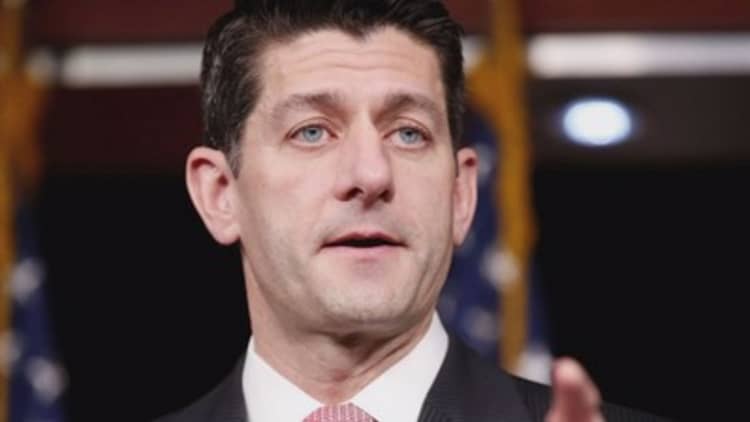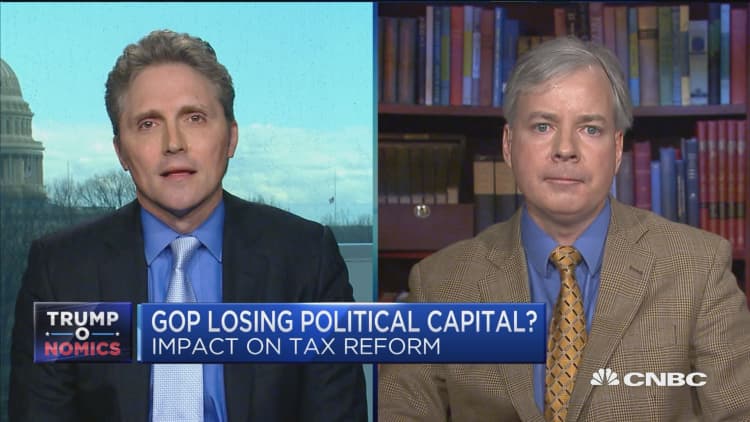
Republican hopes for a bipartisan deal on tax reform dimmed on Monday, as an influential liberal think tank came out against key elements of the GOP proposal.
The Center for American Progress said it opposes cutting corporate taxes and lowering rates for wealthy people — two hallmarks of the blueprint crafted by House Republican leaders and of the plan released by President Donald Trump on the campaign trail.
Both GOP leadership and the administration had reached out to Democrats in recent days to assess the potential for an alliance amid the discord within the Republican party. Though lawmakers on both sides of the aisle appeared at least willing to engage in discussion, the CAP report underscored how vast the gulf between the two sides remains.
"If any legislation cuts taxes for corporations or the wealthiest Americans by even $1, lawmakers should vote no," the report stated.

CAP did not directly oppose lowering the corporate tax rate, which stands at 35 percent and is one of the highest among developed nations. However, the group said it would object to any measure that reduces federal tax revenue from businesses. In other words, a lower rate would need to be offset with other business taxes.
Neither the Trump campaign plan or the House blueprint achieve that goal. Trump proposed slashing the corporate rate to 15 percent, but did not detail how to pay for it. The White House has promised a more comprehensive proposal for weeks, but has not yet released one.
The House blueprint cuts rates to a more modest 20 percent, financed in part through the controversial "border adjustment," which allows companies to deduct the cost of domestic production but penalizes imports. House Speaker Paul Ryan and Rep. Kevin Brady, R-Texas, chairman of the tax-writing Ways and Means committee, have pledged that their plan will be "revenue neutral," meaning that it will not add to the deficit.
The evidence is clear: Tax cuts do not pay for themselves.Center for American Progress
However, Republicans and Democrats differ on how to calculate that. The White House has said it intends to factor in the economic benefits of tax cuts in estimating the cost of its proposals, a process known as dynamic scoring. But CAP argued Monday that the cost of the tax bill should be determined without that benefit.
Accounting methods can result in starkly different price tags. Using dynamic scoring, the conservative Tax Foundation estimated that the House blueprint would increase the deficit by $191 billion over the next decade. Without it, the House plan would cost $2.4 trillion.
"The evidence is clear: Tax cuts do not pay for themselves," the CAP report said.
Even so, the math on corporate taxes would not pass muster with CAP. The House plan offsets reductions in business tax with expected increases in individual taxes that supposedly will result from a stronger economy. CAP said it wants business tax reductions paid for with other business tax increases.
That's a far cry from the stance of conservative Republicans, who recently have indicated that they would be willing to allow the deficit to increase in order to achieve significant reductions in tax rates. House Freedom Caucus Chairman Rep. Mark Meadows said last month that there is "a lot of flexibility" among the group's members on whether tax cuts would need to be fully offset with other sources of revenue.
Most benefits go to the rich?
Also at issue is how to tackle changes to individual tax rates. In an interview on CNBC on the day of his nomination in November, Treasury Secretary Steven Mnuchin promised "no absolute tax cut for the upper class." He disputed several analyses of Trump's campaign plan that showed wealthy households would benefit the most under his proposals.
Even the House blueprint would deliver most of the gains to the rich. The Tax Foundation found that the average household would see their income rise by 8.4 percent, using dynamic scoring. But the top 1 percent of households would enjoy a 13 percent increase, the biggest jump of all.
"In the past, Congress has traded tax cuts for the wealthy and corporations in exchange for continuing important tax benefits for working families," the CAP report stated. "But this has gone far enough."
And another hurdle
There is also the potential for an accord on tax reform to get derailed by an entirely separate issue. Brady held his first meeting with Democrats on his committee on tax reform last week and pledged to hold hearings on the bill, which he said would likely be introduced this spring. But Democrats were irked that Brady announced a letter calling for the removal of IRS Commissioner John Koskinen at the same time.
"Democrats raised this letter with Republicans during the meeting," a committee aide said, "noting how this type of partisan action hurts the prospects of bipartisanship in other issues, such as working together on issues like tax reform."

